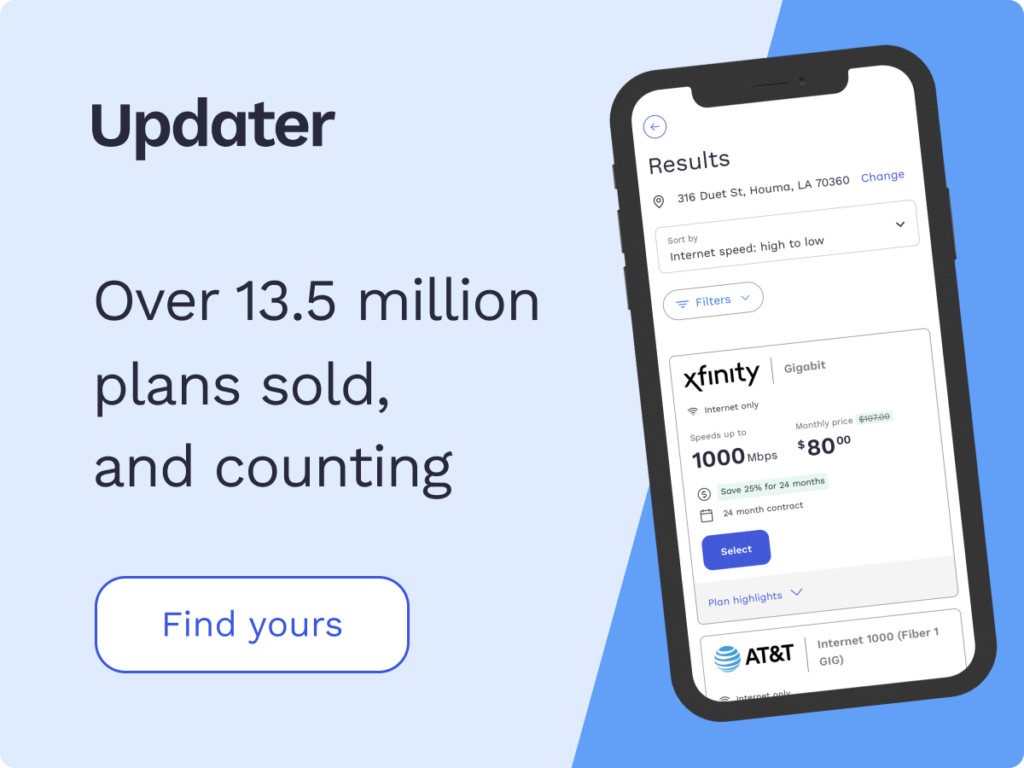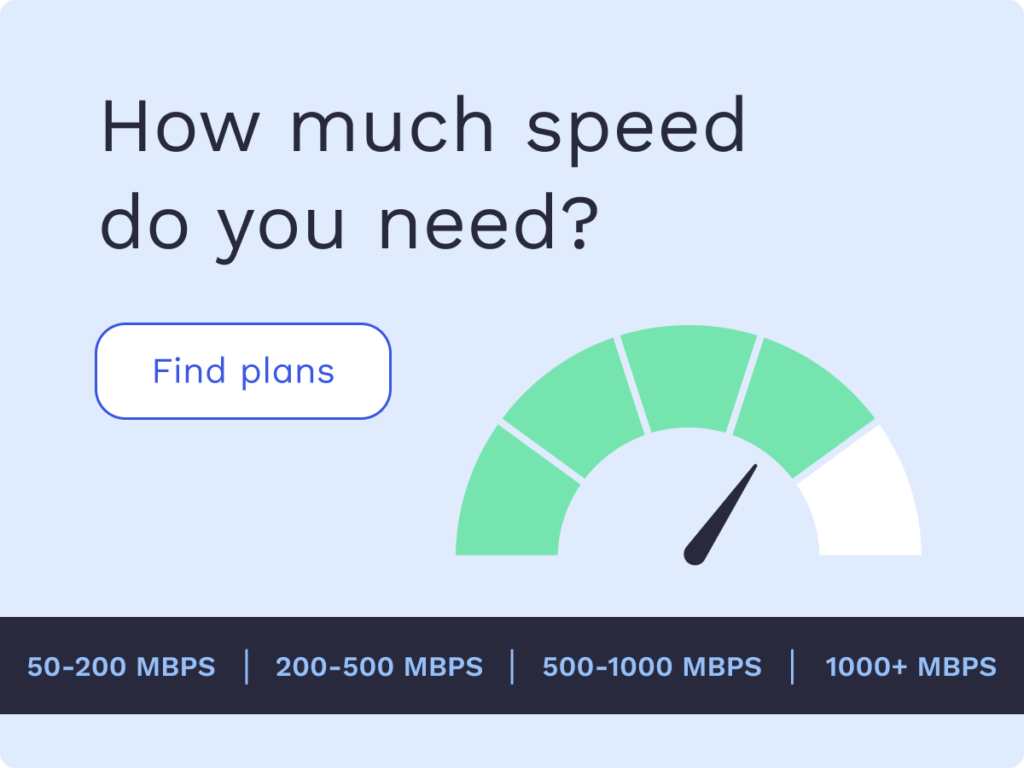How does Viasat compare to HughesNet internet?

While satellite internet providers Viasat and HughesNet have some things in common, there are subtle differences that may make you lean more towards one or the other. Viasat offers unlimited data, which enables you and the rest of your family to stream content, play games, email, videoconference and work from home without having to worry about hitting any data ceilings. HughesNet, on the other hand, has data caps, and these can limit how much time you or your family members spend online.
As you think about which internet service to purchase, it’s important to take into account your budget, the needs of those in your household, and how much speed each user needs. We’ve compared Viasat vs HughesNet and outlined their major differences to help you decide which internet service provider (ISP) will best serve you and your family.
- Who Viasat and HughesNet internet are for
- Key considerations
- What others say about Viasat and HughesNet internet
- How do Viasat and HughesNet internet packages compare?
Who Viasat and HughesNet internet are for
Viasat
Viasat offers an entry-level plan that may appeal to users on a budget, as well as four more plans for users that want more bandwidth. One feature that differentiates Viasat from HughesNet is its unlimited data, making it a good choice for customers that need internet without data caps.
Do you need to stream video on a few devices at once? If so, Viasat may be able to give you enough speed, particularly with its Unlimited Silver, Unlimited Gold, and Unlimited Platinum plans, which offer 25Mbps, 50Mbps, and 100Mbps, respectively. However, if you have online gamers in your household, Viasat may not be the best choice. Even though the download speeds are fast enough, especially in the Gold and Platinum plans, the upload speeds are limited to 3Mbps, regardless of the plan you choose. This would make it difficult for certain types of games to perform the way they’re supposed to, including first-person shooter (FPS) and adventure games that enable users to communicate with other players live.
HughesNet
HughesNet’s plans are very different from Viasat’s, particularly because their tiers are categorized according to how much data users are allotted each month. This makes HughesNet a good option for users that don’t mind data caps. For example, if you want to limit how much time people in the household spend online, such as on social media sites, the data caps in HughesNet’s plans can help you stick to a data budget and limit screen time.
Similar to Viasat, HughesNet’s upload speeds are limited to 3Mbps, making them a less-than-ideal option for online gaming. HughesNet’s download speeds are consistent at 25Mbps across all plans, which differentiates them from Viasat. With consistent speeds of 25Mbps, you have more than enough bandwidth to handle video conferencing, work from home setups, and a few devices streaming simultaneously, especially if you limit the amount of high-definition content you access.
Key considerations
Equipment fees
Viasat charges a monthly fee of $9.99 to lease their equipment, but you also have the option to pay for a lifelong lease for $299. HughesNet’s monthly equipment fee is $14.99, and to buy the equipment outright, you can make a one-time payment of $450.
Installation options
You have to opt for professional installation with both Viasat and HughesNet. This is due to the technology involved in satellite internet service and costs $300 for Viasat and $400 for HughesNet.
Early termination fees
Both Viasat and HughesNet have early termination fees. Viasat fees are based on the number of months you have left on your contract, charging $15 for each month that remains. HughesNet’s early termination fee starts at $400, but that only applies if you terminate within the first 90 days of subscribing. After that, the amount you have to pay decreases by $15 each month.
Unreturned equipment fees
Both Viasat and HughesNet have similar unreturned equipment fees. If you choose to hold on to your equipment after terminating your service, you will be charged $300, whether you’re with Viasat or HughesNet.
Dish relocation costs
HughesNet provides free dish relocation services so if you move, you don’t have to pay extra to have their installers come out and reinstall your dish. Viasat’s relocation program is different in that it’s only free after you sign up for their Viasat EasyCare service. This costs $8.99/month and gives you access to their dish relocation services.
What others say about Viasat and HughesNet internet
Viasat
Viasat, according to a review by CNET, is a popular option, but their speeds may vary according to your location. The review highlights how their download speeds, which range between 12 and 100Mbps may vary significantly if you live in certain areas. For example, in many places, “Viasat only offers the 12Mbps speed tier.”
However, the review also notes that Viasat’s high-speed service is available to a wide variety of users, specifically pointing out that “Viasat offers speeds up to 100Mbps in 48 ZIP codes across 31 states.” Another check in the plus column is earned for Viasat’s availability, which “reaches nearly every nook and cranny across all 50 states.”
HughesNet
HughesNet earns accolades for both availability and consistency. According to a CNET review, HughesNet, when compared with Viasat, “has a better track record with outages.” The review goes on to emphasize HughesNet’s consistency, mentioning that the ISP “offers the same broadband speeds to all customers in all regions.”
The speeds HughesNet offers, however, may not be enough for many users, so the review continues by saying, “if speed is what you need, you might want to keep looking.” At the same time, the review makes a point of saying that HughesNet’s “consistency of service and speed reliability is a huge plus.”
How do Viasat and HughesNet internet packages compare?
*Pricing varies by location and availability. Speeds may vary. All prices subject to change; for current pricing and availability visit our internet service page. Prices as of 3/12/22.
Disclosure | Updater articles are based on our own data and research, independent from partner relationships. We are not compensated by partners for information and opinions presented here. Our Editorial Terms of Service can be found here.














